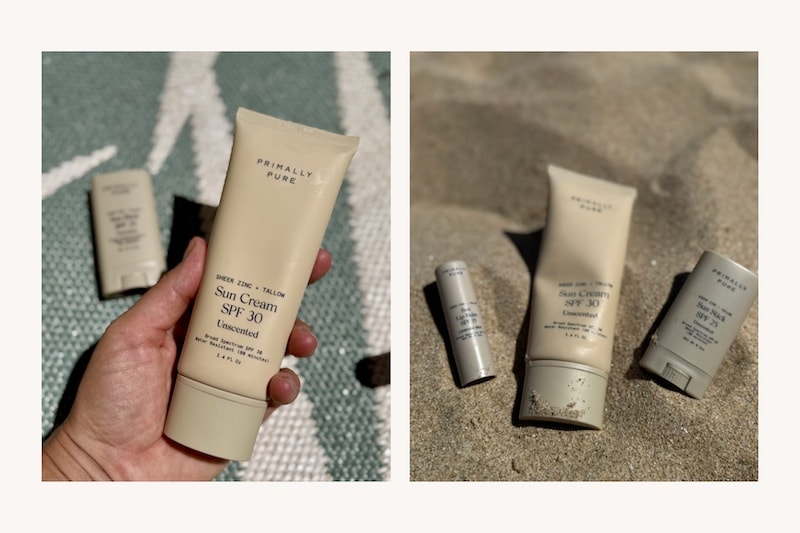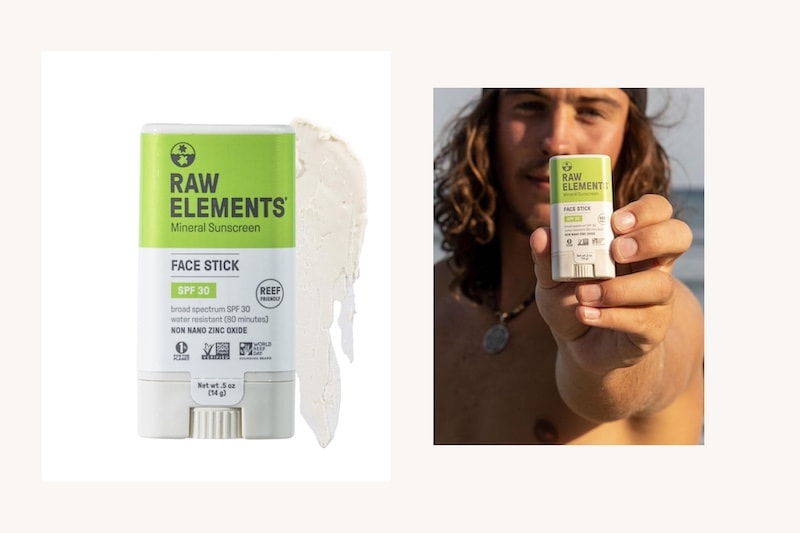Table of Contents
The 13 Best Non Toxic Sunscreen Brands for the Safest Sun Protection
This page may contain affiliate links. We may earn a commission on purchases, at no additional cost to you. Learn more →
We all want to head to the pool looking fresh and radiant—who doesn't? That's why wearing non-toxic sunscreen is essential to protect our skin from the sun's powerful rays and keep it looking and feeling healthy.
The unfortunate thing is that the sunscreen products, just like with other daily beauty products we may be used to often contain harmful chemicals that are linked to causing cancer, hormone disruption, and skin irritation.
Does this mean we can't enjoy a beautiful sunny day without exposing our skin to harmful chemicals? Not at all. Mineral-based, non toxic, effective, and natural sunscreens to the rescue!
In this article, we'll look into the science behind non toxic sunscreen and why we should incorporate this healthier switch into our clean living journey.
Let's get to it.
What is Non-Toxic Sunscreen?
Non toxic sunscreens are becoming increasingly popular as people begin to be more health-conscious and more mindful of the products they use on their skin.
Non toxic sunscreens use natural ingredients such as zinc oxide and titanium dioxide - both of which are active ingredients to protect the skin against the sun. These ingredients are also found in non toxic makeups and various cosmetic products.
Unlike chemical sunscreens, natural alternatives don't have potentially harmful ingredients such as parabens, octinoxate, and oxybenzone.
This type of sunscreen also comes in various forms, such as paste, stick, and lotion. If you're not into using these, there are also nontoxic spray sunscreens available.
All our recommended sunscreens use 100% mineral-only actives (zinc oxide and/or titanium dioxide) – no oxybenzone, octinoxate, or other chemical absorbers. We also prioritized products with the highest safety and environmental standards (EWG Verified, MADE SAFE, Organic certifications, etc.) and those that are reef-safe, cruelty-free, and packaged sustainably whenever possible.
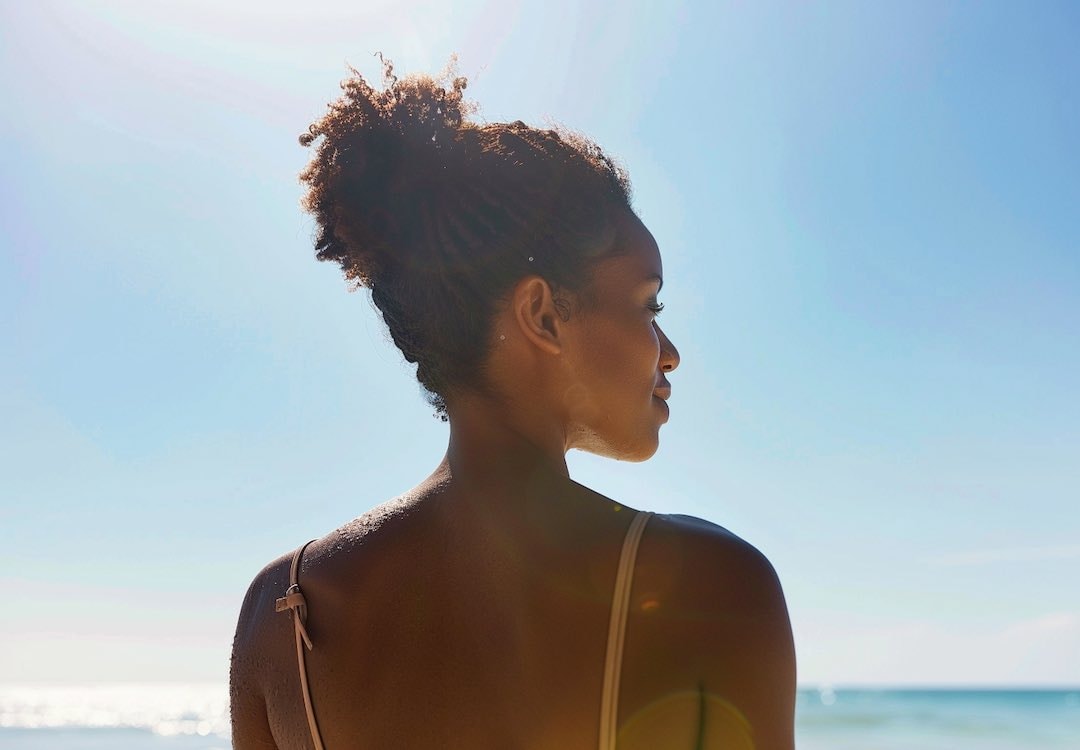
What are The Best Non Toxic Sunscreen Brands?
These are the best non toxic sunscreens on the market that we've personally tested and loved.
Here are our top picks of non toxic sunscreen brands:
Primally Pure | Shop here *– (Top Pick, best overall)
Raw Elements | Shop here*
Ilia | Shop here*
Earth Mama | Shop here*
ThinkSport | Shop here*
Babo Botanicals | Shop here*
Attitude | Shop here*
Badger Baby | Shop here*
Think Baby | Shop here*
Beauty by Earth | Shop here*
Thrive | Shop here*
Two Peas | Shop here*
All Good | Shop here*
How Do We Choose the Best Non Toxic Sunscreen?
Sunscreen is a product we use daily, so we've gone the extra mile in choosing the products that make our list. Our selection process for the best non toxic sunscreen brands is extensive and tailored to our needs.
After thorough testing and research of over 50 different sunscreens, focusing only on 100% mineral formulations, and gathering user reviews, we've curated our top choices based on their ingredients, performance, and customer satisfaction.
Each sunscreen below is free from oxybenzone, octinoxate, and other chemicals linked to health or environmental issues . You’ll find only non-nano zinc oxide or titanium dioxide as the active ingredient, blended with natural oils and extracts that nourish the skin.

What is the Best Natural Non Toxic Sunscreen?
Primally Pure Sun Cream SPF 30* (Top Pick)
(use code Orbasics for 10% off)
Best For: Face & body; all skin types (including sensitive)
Pricing: $38 (3–4 oz)
Certifications: N/A (Small-batch brand; reef-safe formula)
SPF: 30 (broad-spectrum)
Key Non-Toxic Ingredients: Non-nano Zinc Oxide (25%), Organic Tallow, Organic Beeswax, Organic Coconut Oil, Organic Mango Butter, Vitamin E
Why We Like It: This new favorite mineral sunscreen is a game-changer! Primally Pure’s Sun Cream uses just 9 natural ingredients – and nothing synthetic or chemical – yet it provides superb protection. It’s reef-safe and free from any hormone disruptors or artificial fragrances. We found the texture to be rich but fast-absorbing, with no pasty white cast. In fact, it leaves a sheer, glowy finish without feeling greasy . The formula is packed with skin-nourishing goodies like grass-fed tallow and mango butter, so our skin actually feels hydrated and healthy after sun exposure. It’s also water-resistant (80 minutes) and gentle enough for toddlers and those with sensitive skin (no stinging eyes or irritation at all) . Primally Pure has truly raised the bar – this SPF 30 cream has become a must-have for our whole family. Plus, they offer it in a convenient SPF 25 Sun Stick* and even a SPF 15 Sun Lip Balm *for on-the-go protection!
Shop Primally Pure Sun Cream here* (use code Orbasics for 10% off)
Ilia Sunscreen* (Tinted sunscreen)
Best For: Oily skin and sensitive skin
Pricing: $48 (1 fl oz)
Certifications: N/A
SPF: 40
Key Non Toxic Ingredients: Zinc oxide, Squalane, Shea butter
Why We Like It: We loooooove this clean face sunscreen ! : A true multitasker that blends mineral sunscreen, skin‑care actives, and light coverage—all without silicones, synthetic fragrance, or chemical UV filters. I´ve been using it for years now and it´s still my very favorite if I want wearing any makeup. Its dewy finish and light to medium coverage are perfect year-round. I can't help but recommend it to everyone who is looking for skincare products that are safe for sensitive skin. Yes, the formula contains a handful of safe synthetics to keep the serum fluid—but every one is rated low‑hazard by EWG and none appear on its “unacceptable” list.
You can also send them a selfie, and they'll help you find the perfect shade that matches your skin color. And the SPF? Just another reason to love it even more!
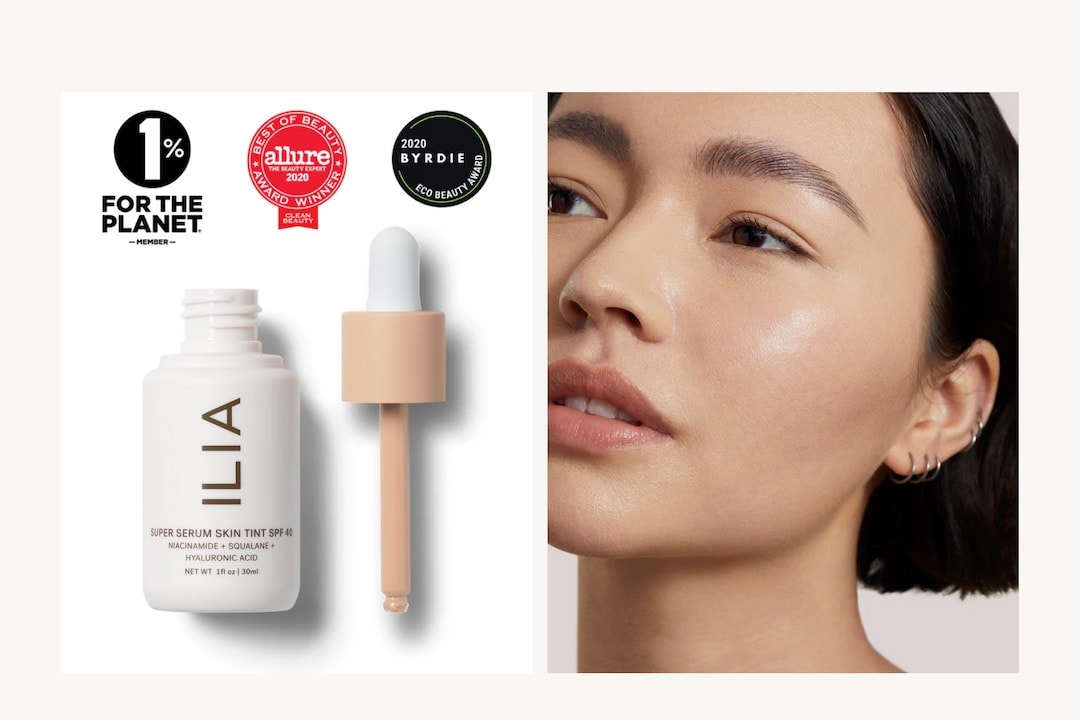
Earth Mama*
Best For: Sensitive skin of all ages
Pricing: $18.99 (3 oz)
Certifications: EWG, Leaping Bunny, Oregon Tilth
SPF: 40
Key Non Toxic Ingredients: Zinc oxide, Coconut oil, Jojoba oil, Shea butter
Why We Like It: We tried this sunscreen at the beach on an 80-degree day. We applied it once and didn't get a burn at all. We love its safe ingredients. The texture seemed grainy but smooth when applied. Overall, we're very satisfied with this amazing product. It's a great all-natural sunscreen!
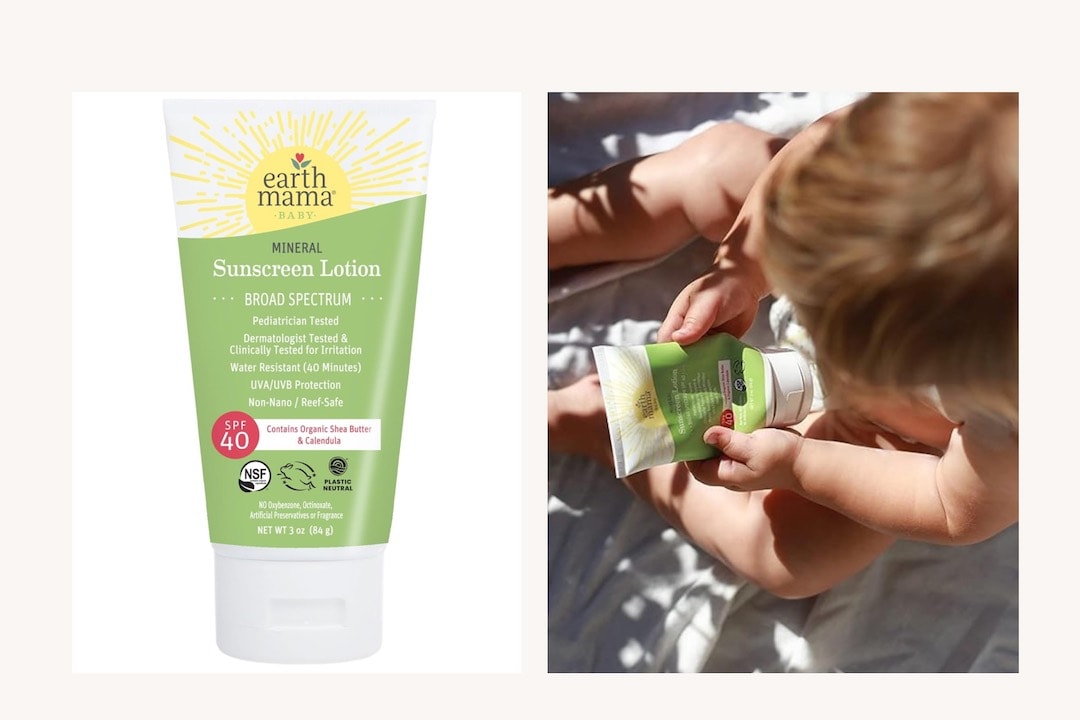
ThinkSport*
Best For: Athletes, sports, and active use
Pricing: $13.50 (3 fl oz)
Certifications: EWG
SPF: 50
Key Non Toxic Ingredients: Zinc oxide, Epsom salt, Jojoba oil, Sunflower oil
Why We Like It: This sunscreen is a lifesaver for outdoor workouts! We use it on our face, ears, and neck during long runs in the sun. Despite the sweat and heat, it stays put, keeping me fair and burn-free. Like any sunscreen, remember to reapply after a few hours. Overall, it is a reliable choice for active days under the sun!
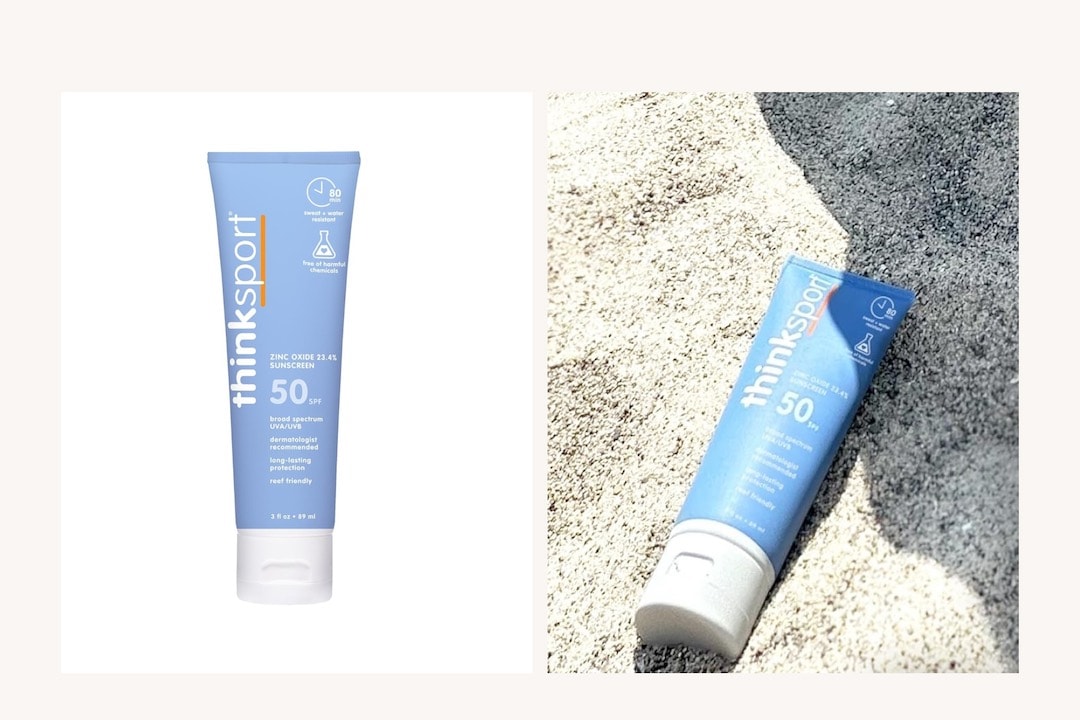
Babo Botanicals*
Best For: Babies and kids
Pricing: $19 (3 fl oz)
Certifications: EWG
SPF: 50
Key Non Toxic Ingredients: Shea butter, Calendula, Sunflower oil, Coconut oil
Why We Like It: It's okay to be picky about sunscreens if you have a baby. This sunscreen came highly recommended, and let me tell you, it's a game-changer! Easy to apply, no strong scent, and it keeps the skin smooth and protected. Bonus: it's travel-sized approved! We feel completely safe using it, knowing it's free of any harmful ingredients for my baby. Highly recommend!
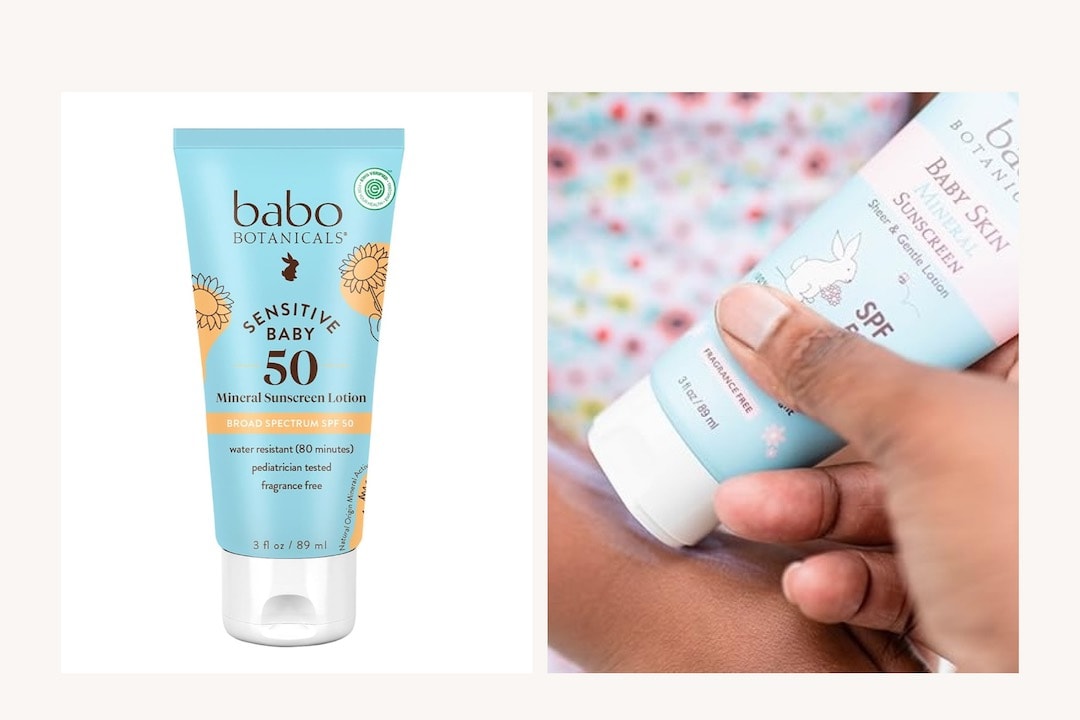
Attitude*
Best For: Sensitive skin
Pricing: $22.49 (5.2 fl oz)
Certifications: EWG, PETA
SPF: 30
Key Non Toxic Ingredients: Zinc oxide, oat, soybeans
Why We Like It: We stumbled upon this sunscreen and hit the jackpot! It's EWG verified, which gives us peace of mind knowing it meets high safety standards. It's not the easiest to apply, but for me, avoiding excess chemicals on my skin is totally worth it. My skin feels protected, and I feel good about using a product that prioritizes safety and the environment.
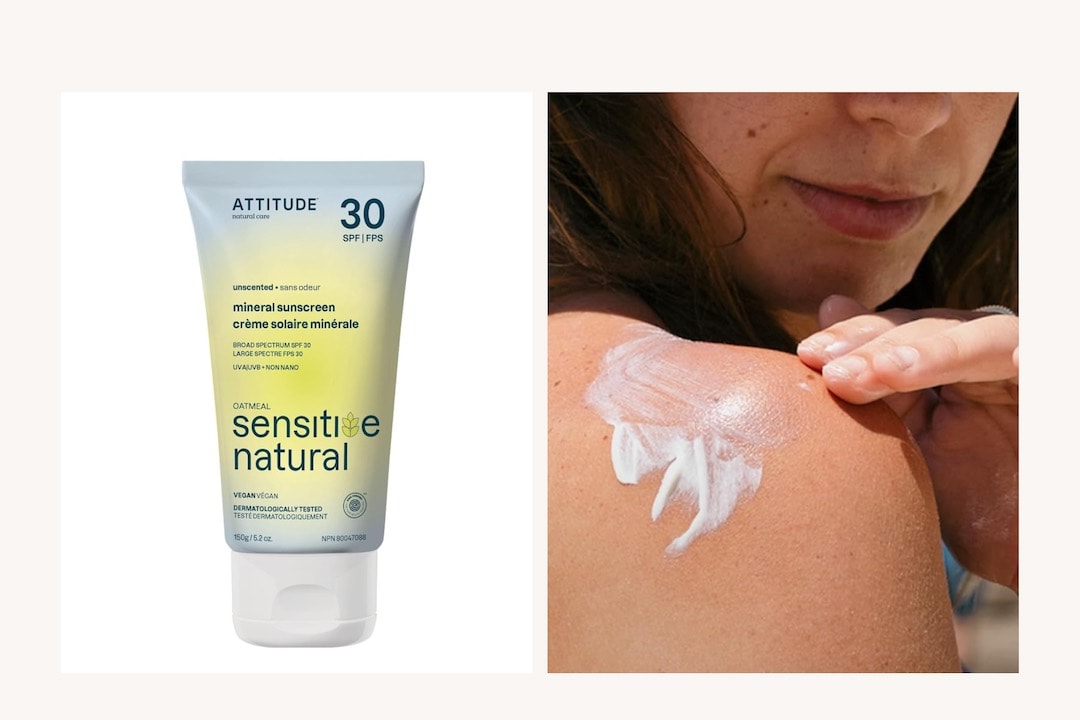
Badger Baby*
Best For: Babies and toddlers
Pricing: $16.99 (2.9 fl oz)
Certifications: Leaping Bunny, NSF, B Corp
SPF: 40
Key Non Toxic Ingredients: Organic Sunflower oil, Jojoba oil, Calendula, Organic chamomile
Why We Like It: Discovering this sunblock was a charm for my baby's sun protection. While it's a bit tacky and takes time to dry, its non-toxic formula and effectiveness make it worth it. With just two applications a day, my baby stays burn-free, thanks to its thick consistency. What makes it more interesting is its organic ingredients, which are 98% . It is also "Reef Safe - Hawaii and Mexico approved," making it the perfect sunscreen for the whole family !
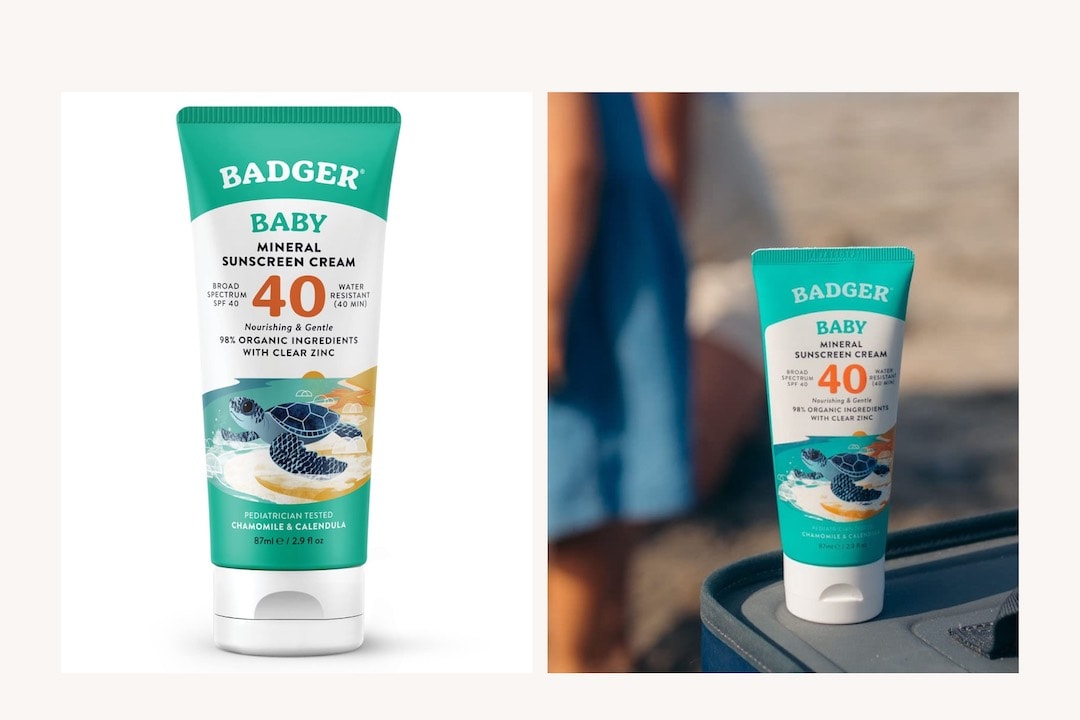
Think Baby*
Best For: Babies, sensitive skin
Pricing: $18.50 (6 fl oz)
Certifications: Leaping Bunny
SPF: 50
Key Non Toxic Ingredients: Papay fruit extract, Sunflower oil, Jojoba seed oil
Why We Like It: Taking our little one for a stroll is now a breeze, thanks to this awesome sunscreen. It's like a fancy lotion that spreads easily with just a little bit. A tiny squeeze covers his arms, legs, and face really well. What's cool is it smells nice and has a sweet scent, like vanilla mixed with oranges. And with his cute sunhat and sunglasses, he's not just ready for sunny days – he's super stylish!
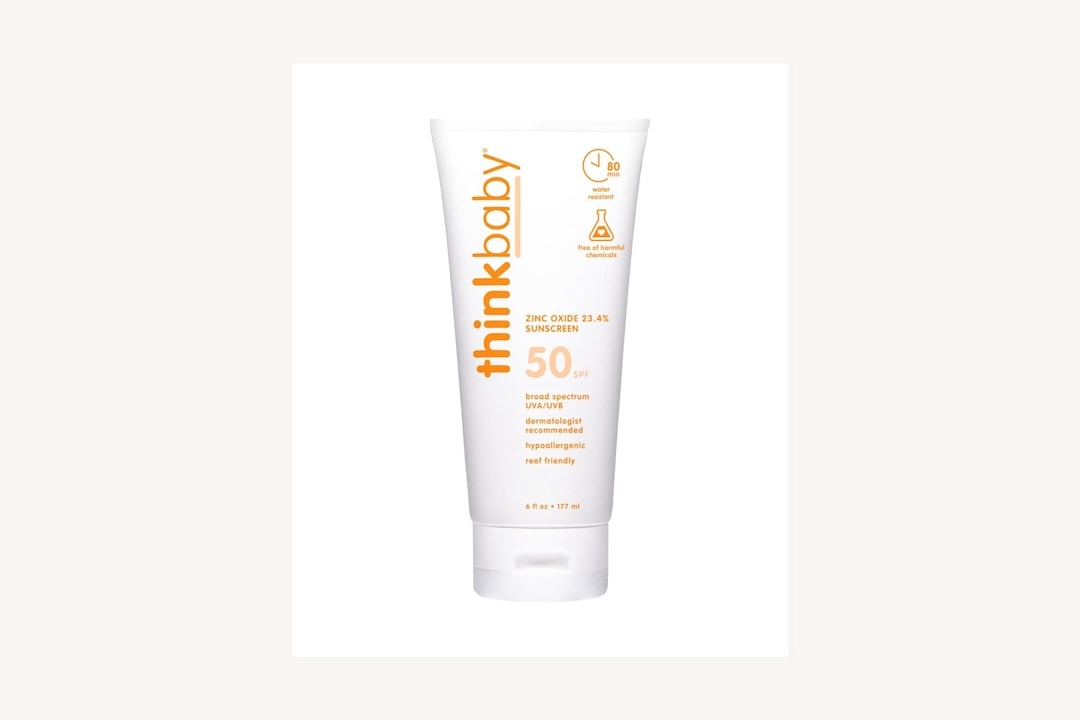
Beauty by Earth Natural Sunscreen Set*
Best For: Facial & daily sunscreen set
Pricing: $19.99 (4 fl oz)
Certifications: N/A
SPF: 25
Key Non Toxic Ingredients: Aloe vera leaf juice, Coconut oil, Shea butter
Why We Like It: We received this sunscreen quickly, and it was packed well. Checking the ingredients, we were happy to find out that they were all organic. It's thick, so a little goes a long way, and it's not greasy despite all the moisturizing oils. It sets quickly, so we can jump right into the pool after applying it.
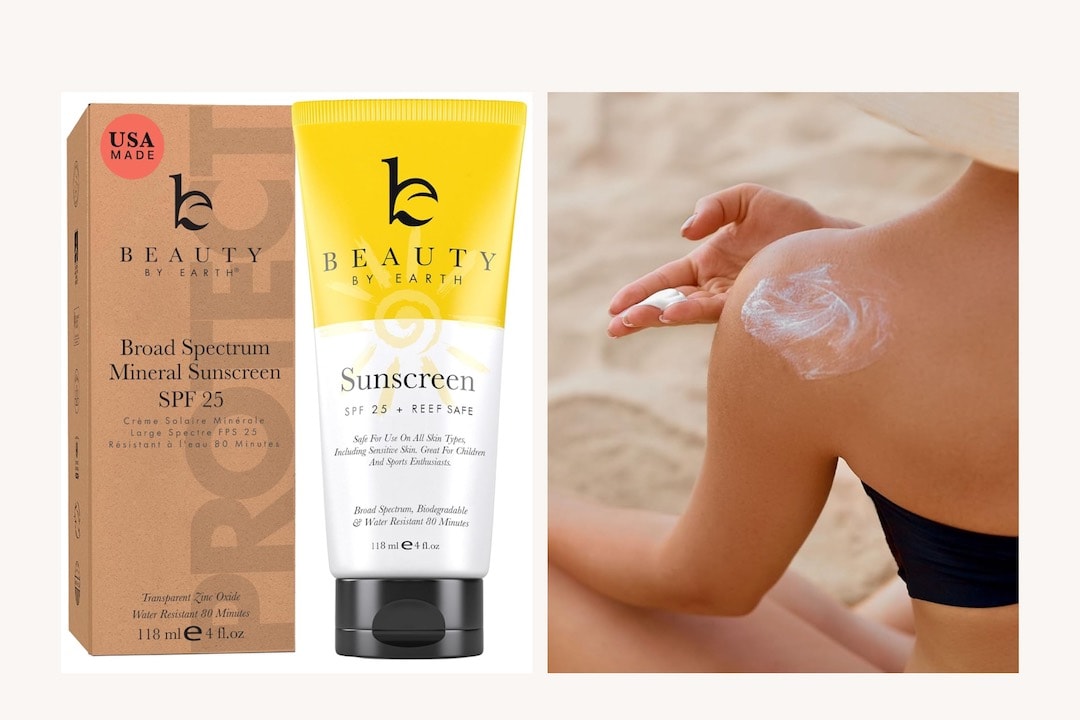
Thrive*
Best For: Face, sun-damaged skin
Pricing: $26.96 (2 fl oz)
Certifications: Plastic Negative
SPF: 30
Key Non Toxic Ingredients: Wakame Seaweed, Tazman Pepper, Arabica Coffee Oil
Why We Like It: I did a bunch of research to find the right sunscreen to keep my skin looking fresh. Lots of folks suggested mineral sunscreen, but I didn't want one that would leave a white residue. After checking out tons of options, I decided to give Thrive's SPF 30 Face Sunscreen a shot. It uses non-nano zinc oxide, which is safe and effective for sensitive skin. And let me tell you, the empty bottle in my bag is proof that I'm in love with this formula!
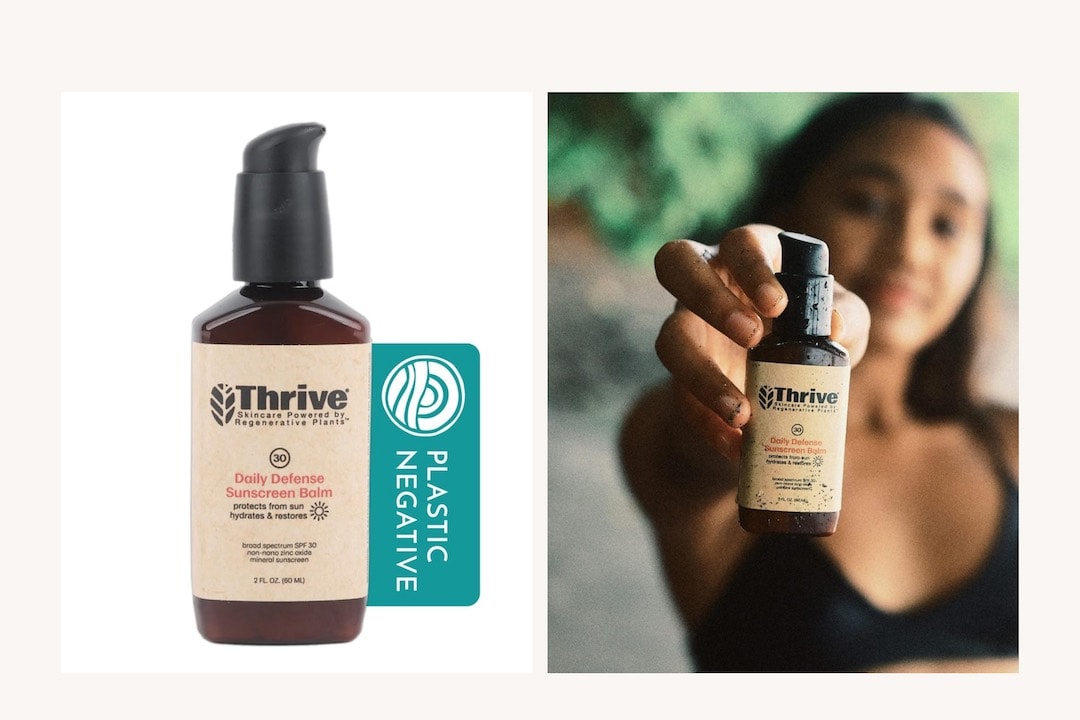
Two Peas*
Best For: Babies, kids, and families
Pricing: $16.99 (3 fl oz)
Certifications: EWG, Leaping Bunny, NSF
SPF: 50
Key Non Toxic Ingredients: Zinc oxide, Beeswax, Sunflower oil
Why We Like It: So, after trying out this sunscreen, here's what I found: it does leave a bit of a white layer on your skin and takes some effort to rub in evenly. But! The thin white layer makes it easier to know where it's applied. I tried it on my little one, and it helped me see whether that wiggly right arm got fully covered. And once it's on, my baby's skin feels really nice – soft and not too oily.
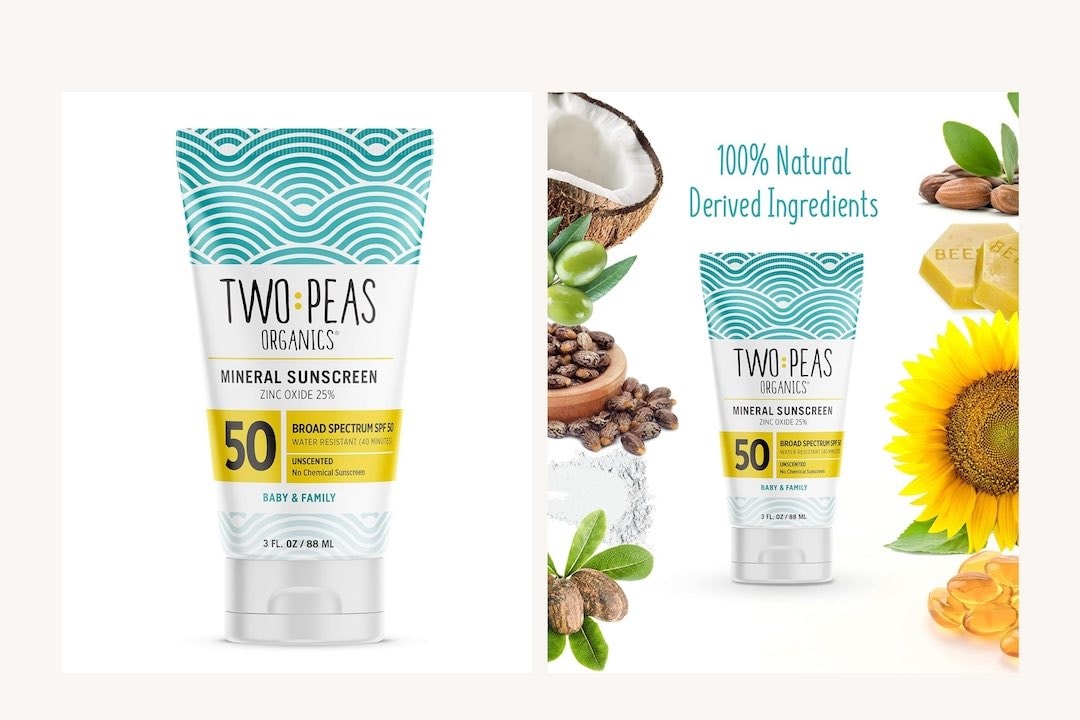
All Good*
Best For: Face, swimming, and other water activities
Pricing: $12.99 (1.1 oz)
Certifications: Leaping Bunny, Climate Neutral, 1% for the Planet, B Corp
SPF: 30
Key Non Toxic Ingredients: Calendula, Shea butter, Beeswax, Jojoba oil, Sesame oil
Why We Like It: This sunscreen is super safe and made mainly of coconut oil and non-nanoparticle zinc oxide. Plus, it's great for sensitive skin – my face didn't break out at all, even after wearing it all day. It's thick and sticky, so I only had to put it on once.
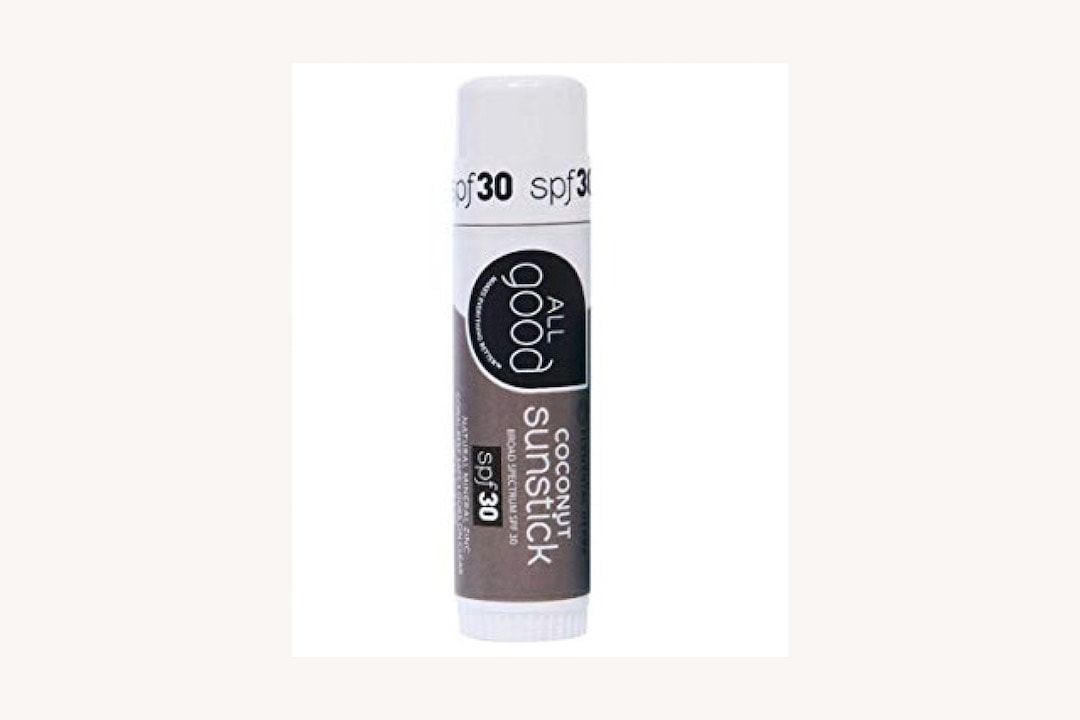
Raw Elements* (Eco Formula Sunscreen Face Stick)
Best For: Beach and ocean activities (reef-safe)
Pricing: $16.99 (Face Stick, SPF 30) – $24.99 (Body Tin or Lotion, SPF 30)
Certifications: Natural Products Association (NPA Certified), Leaping Bunny, 1% for the Planet
SPF: 30 (water-resistant 80 minutes)
Key Non-Toxic Ingredients: Zinc Oxide (23%), Organic Sunflower Oil, Organic Green Tea, Organic Cocoa Butter, Vitamin E
Why We Like It: Raw Elements is the ultimate reef-safe sunscreen, born from a lifeguard’s mission to protect people and the planet. This mineral formula is as pure as it gets – no chemicals, no fragrances, and titanium dioxide-free . It’s made with certified natural and organic ingredients, and you can practically pronounce everything on the label. The texture is a thick paste (in the tin) or a dense stick, which can be warmed in your hands before application. Once applied, it provides a physical barrier that stays on through long surf sessions and beach volleyball games. (You’ll definitely want an oil-based cleanser or soap to remove it at the end of the day – that’s how well it stays put!) The sunscreen is loaded with antioxidants (green tea, cocoa butter) which help nourish your skin while you wear it.
Shop Raw Elements sunscreen here*
What Sets Non Toxic Sunscreen Apart?
Health benefits and environmental impact make non toxic sunscreen distinct. Many other factors set non toxic sunscreen apart from conventional products.
Mineral-Based Formulas
Mineral-based formulas rely on active ingredients like zinc oxide and titanium dioxide to create a protective layer on our skin that reflects sunlight away. This effect offers a broad spectrum of protection without the need for potentially harmful chemicals.
Certifications and Labels
Products that have labels like "Reef Safe," "Non-Nano," or "EWG Verified" mean they met the high standards for safety and environmental friendliness. Having these certifications provides peace of mind, ensuring the high quality of your sunscreens.
Free from Harmful Chemicals
Ingredients such as oxybenzone, octinoxate, and avobenzone are known for their harmful effects on the body and the environment. In non toxic sunscreens, you'll find natural, plant-based ingredients that protect the skin and promote non toxic living.
Non Nano Zinc Oxide
Many people prefer using sunscreens with non nano zinc oxide because they provide effective sun protection without penetrating the skin. The larger particles stay on the surface, reflecting and scattering UV rays. This reduces potential skin absorption and irritation, making it a safer choice, especially for sensitive skin.
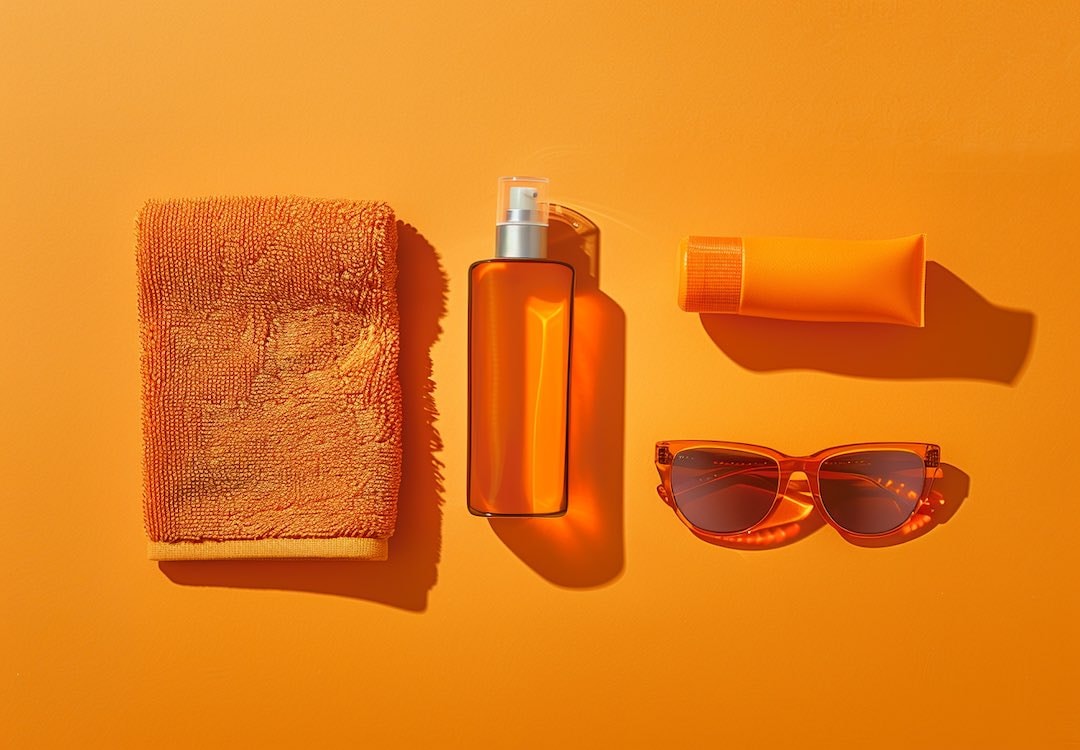
Why Switch to Non Toxic Sunscreen?
While we all enjoy going out on a sunny day, being aware of the health effects of UV rays can lead us to worry about our skin health. These factors make it more difficult for us to choose the best sunscreen to use.
Despite the effectiveness of sunscreen products against sunburns and skin cancer, not all sunscreens are created equal. This is where non toxic sunscreens come in - a healthier alternative that offers sun protection without the potential harm.
-
Protecting Your Health: Traditional sunscreens often contain various toxic chemicals that can be absorbed through the skin and cause harm to the body. Switching to non toxic sunscreens leads to sun protection for your skin while also safeguarding your overall health.
-
Gentle on Your Skin: One of the most common flaws of traditional sunscreens is skin irritation and stinging eyes after application caused by harmful ingredients. Non toxic sunscreens, on the other hand, are formulated with natural active ingredients like zinc oxide and titanium dioxide, which work best for sensitive skin.
-
Eco-Friendly Choice: Chemical sunscreens are known for causing coral bleaching and marine ecosystem damage. Non toxic sunscreens protect and preserve our oceans and marine life.
-
Safe for All Ages: It is challenging to find the safest sunscreen brands that are effective for our little ones, especially for those with sensitive skin. You can give kids mineral sunscreen products that provide a powerful solution suitable for all ages and skin types.
Common Toxic Ingredients Found in Conventional Sunscreen
For safe and effective sun protection, avoid sunscreen products that contain:
-
Oxybenzone: A chemical filter that absorbs UV rays but can cause hormonal disruptions and allergic reactions.
-
Octinoxate (endocrine disruptor): Another UV filter linked to endocrine disruption and potential reproductive toxicity.
-
Homosalate: Used to absorb UVB rays, it can penetrate the skin and accumulate in the body, potentially disrupting hormones.
-
Octocrylene: Stabilizes UV filters but can degrade into harmful byproducts and cause skin irritation.
-
Parabens: Preservatives that prevent microbial growth but are known to mimic estrogen and disrupt hormonal balance.
-
Retinyl Palmitate: A form of Vitamin A that may speed up the development of skin tumors and lesions when exposed to sunlight.
-
PABA (Para-Aminobenzoic Acid): An older UV filter that can cause allergic reactions and skin sensitivities.
-
Synthetic Fragrances: Added for scent, these can contain allergens and irritants, leading to skin reactions and potential long-term health effects.
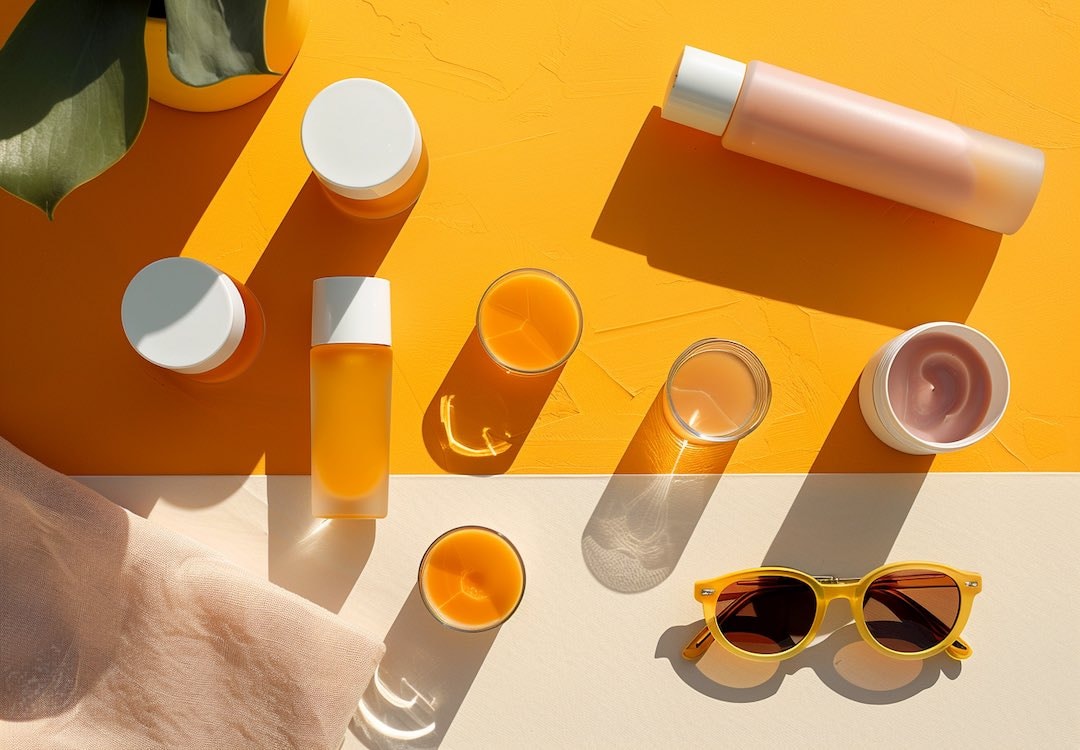
The Sunlight Debate... Good or Bad?
Sunlight offers numerous health benefits, like vitamin D production and mood enhancement, but too much exposure can also pose risks. Let's explore the pros and cons to find a balanced perspective on sunlight's impact on our well-being.
Sunlight is Good
-
Vitamin D Production: Sunlight helps produce vitamin D, which is essential for bone health and a strong immune system. The Vitamin D receptor (VDR) influences at least 927 of our 20,000 genes, making it one of the most powerful hormone systems. It is crucial for intestinal absorption of calcium and magnesium, with 50% of magnesium and 80% of calcium absorption being VDR-dependent.
-
Mood Enhancement: Exposure to sunlight boosts the production of serotonin, a hormone that enhances mood and promotes calmness. Higher serotonin levels are linked to a better mood and a greater sense of well-being, reducing the risk of depression and anxiety.
-
Better Sleep Quality: Natural light helps regulate our circadian rhythm, the body's internal clock that controls our sleep-wake cycles. Getting sunlight during the day helps keep a healthy sleep pattern, leading to better sleep quality and overall improved health.
Sunlight is Bad
-
Skin Aging: UV rays from the sun accelerate the breakdown of collagen and elastin in the skin, leading to wrinkles, sagging, and overall premature aging.
-
Increased Risk of Skin Cancer: Getting too much sun exposure significantly increases the chances of developing different types of skin cancer, like melanoma, basal cell carcinoma, and squamous cell carcinoma. These cancers can be serious and even life-threatening, underscoring the importance of sun protection for skin health.
Tips to get the good without the bad:
-
Optimal Sun Exposure: Aim for sun exposure during early mornings or late afternoons when the UV index is below 3.
-
Avoid Sunburn: Take precautions to prevent sunburn at all times.
-
Protect During High UV Index: Wear a hat or use a UV umbrella* when the UV index is above 4.
-
Vitamin D Supplements: Consider taking Vitamin D supplements*.
-
Use Broad-Spectrum Sunscreen: Choose sunscreens with mineral formulas that protect against both UVA and UVB rays, such as EltaMD*.
-
Opt for Mineral Sunscreens: Whenever possible, use mineral-based sunscreens.
-
Avoid Burns: Remember, a sunburn can be more harmful than using chemical sunscreens, so aim to avoid both.
-
Alternatives to Sunscreen: If you prefer not to use sunscreen, stick to seeking shade and wearing protective clothing.
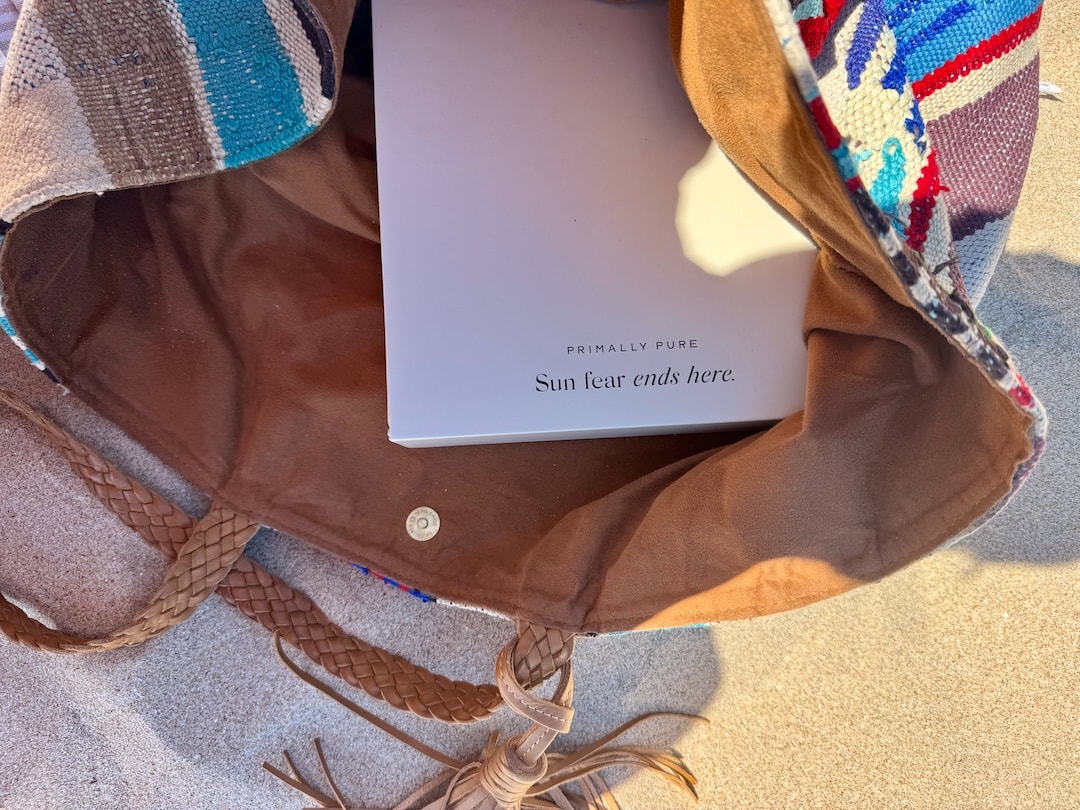
FAQs
What type of sunscreen is non-toxic?
Non-toxic sunscreens typically use mineral ingredients like zinc oxide or titanium dioxide instead of synthetic chemicals for UV protection.
What sunscreen ingredients are non-toxic?
Zinc oxide and titanium dioxide are non-toxic sunscreen ingredients commonly used for safe UV protection. Some other non toxic ingredients are jojoba oil, coconut oil, and almond oil.
Is there such thing as chemical free sunscreen?
"Chemical-free sunscreen" is a misnomer, as all substances are made up of chemicals. However, mineral sunscreens use physical blockers like zinc oxide or titanium dioxide instead of synthetic chemical filters.
Is there a natural alternative to sunscreen?
Yes, mineral sunscreen, which uses ingredients like zinc oxide or titanium dioxide, is a natural alternative to chemical sunscreen.

